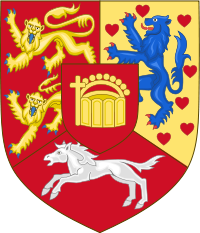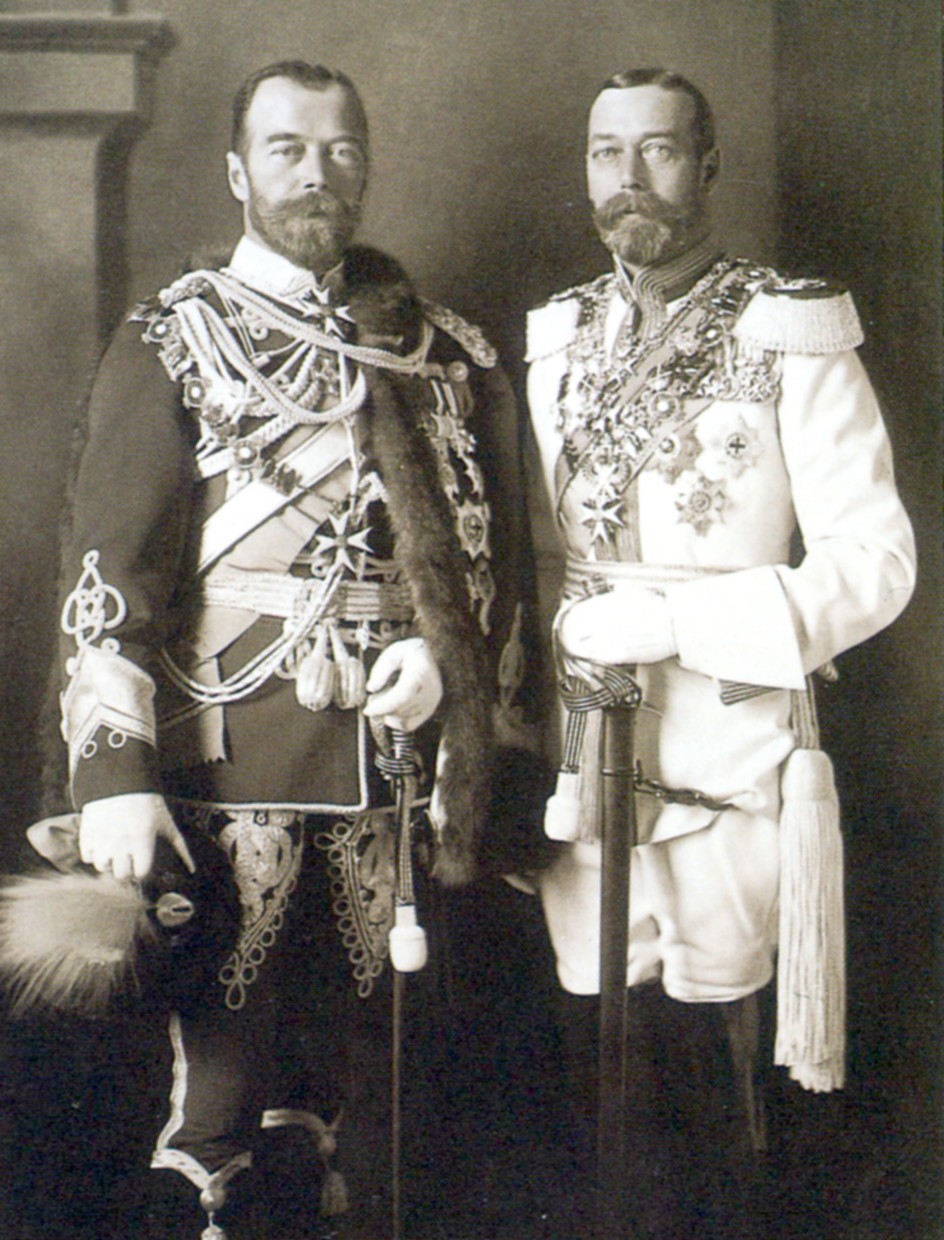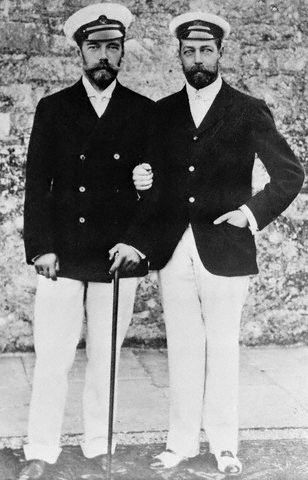Family feud: World War I
Numerous accounts of World War I,
known until World War II happened as just “the Great War”,
have commented on the relations (by birth or marriage)
between the rulers of three of the major participants,
Great Britain, Germany, and Russia.
I was recently reading Margaret MacMillan’s The War That Ended Peace
which emphasizes the personal characteristics of
the major decision-makers who enabled that war,
including those family relations.
It sharpened my knowledge of exactly what those relations were.
This major part of this post is a table
which attempts to show those relations.
Note that Prince Philip is a great-great-grandchild of Queen Victoria,
via Princess Alice, Princess Victoria, and Princess Alice of Battenberg,
and great-grandchild of Christian IX and Louise,
via George I of Greece and Prince Andrew of Greece and Denmark.
A typical person has four grandparents;
thus three unrelated individuals will have a total of twelve grandparents,
while three siblings will still have just four grandparents.
The trio of Kaiser Wilhelm II, King George V and Tsar Nicholas II
have eight grandparents,
thus by one measure they are halfway between being totally unrelated
and being siblings.
The collapsing may be expressed by “equations”:
the paternal grandparents of King George V =
Queen Victoria and Prince Albert =
the maternal grandparents of Kaiser Wilhelm II
the maternal grandparents of King George V =
King Christian IX and Queen Louise =
the maternal grandparents of Tsar Nicholas II
Between Queen Elizabeth II and her consort, Prince Philip,
we have the following “equations”:
(Queen Elizabeth father : King George VI father : King George V father : King Edward VII parents) =
Queen Victoria and Prince Albert =
(Prince Philip mother : Princess Alice of Battenberg mother : Princess Victoria mother : Princess Alice parents).
In words,
Queen Elizabeth’s paternal-paternal-paternal great-great-grandparents =
Queen Victoria and Prince Albert =
Prince Philip’s maternal-maternal-maternal great-great-grandparents.
(Queen Elizabeth father : King George VI father : King George V mother = Princess Alexandria parents ) =
King Christian IX of Denmark and Louise of Hesse-Kassel =
(Prince Philip father : Prince Andrew of Greece and Denmark father : Prince William = King George I of Greece parents).
In words,
Queen Elizabeth’s paternal-paternal-maternal great-great-grandparents =
King Christian IX of Denmark and Louise of Hesse-Kassel =
Prince Philip’s paternal-paternal great-grandparents.
George V and Nicholas II:
see the post “King George V & Tsar Nicholas II”
Here are some of the articles written for the hundredth anniversary
of the start of World War I:
100 years later,
we still spend too much time talking about how World War I started.
The real lessons are in why it lasted so long.
BY Stephen M. Walt
Foreign Policy Blog, 2014-07-30
known until World War II happened as just “the Great War”,
have commented on the relations (by birth or marriage)
between the rulers of three of the major participants,
Great Britain, Germany, and Russia.
I was recently reading Margaret MacMillan’s The War That Ended Peace
which emphasizes the personal characteristics of
the major decision-makers who enabled that war,
including those family relations.
It sharpened my knowledge of exactly what those relations were.
This major part of this post is a table
which attempts to show those relations.
| List of German monarchs | List of English monarchs List of British monarchs | List of Danish monarchs | List of Russian rulers | List of Holy Roman Emperors List of Austrian emperors | List of French monarchs | |||||||||||||
|---|---|---|---|---|---|---|---|---|---|---|---|---|---|---|---|---|---|---|
| House of Hohenzollern | House of Plantagenet House of Lancaster House of York House of Tudor House of Stuart House of Hanover House of Saxe-Coburg and Gotha House of Windsor | House of Glücksburg | House of Romanov | House of Habsburg House of Habsburg-Lorraine | House of Bourbon | |||||||||||||
 |         |  |  |   |  | |||||||||||||
| King Edward III b. 1312, r. 1327-77 and Philippa of Hainault (They had fourteen children!) (Possible) Shakespeare play | ||||||||||||||||||
| Edward, the Black Prince b. 1330, d. 1376 and Joan of Kent Note: Edward never became king, but his son Richard II did. | John of Gaunt, 1st Duke of Lancaster b. 1340, d. 1399 and Blanche of Lancaster The third surviving son of King Edward III of England and Philippa of Hainault. John never became king, but his son Henry IV did. Three succeeding houses of English sovereigns from 1399— the Houses of Lancaster, York and Tudor— were descended from John through Henry Bolingbroke, Joan Beaufort and John Beaufort, respectively. Founder of the House of Lancaster. | |||||||||||||||||
| King Richard II b. 1367, r. 1377-99 Shakespeare play | King Henry IV (Bolingbroke) b. 1367, r. 1399-1413 and Mary de Bohun Shakespeare play First monarch from the House of Lancaster | |||||||||||||||||
| King Henry V b. 1386, r. 1413-22 and Catherine of Valois Shakespeare play | ||||||||||||||||||
| King Henry VI b. 1421, r. 1422-61 and 1470-71 Shakespeare play Last monarch from the House of Lancaster | ||||||||||||||||||
| Richard of York, 3rd Duke of York b. 1411, d. 1460 and Cecily Neville Note: He never became king, but he fathered Edward IV and Richard III, who did. | ||||||||||||||||||
| King Edward IV b. 1442, r. 1461-70 and 1471-83 First monarch from the House of York. | King Richard III b. 1452, r. 1483-85 Shakespeare play Notes: Killed in the Battle of Bosworth Field, ending the Wars of the Roses. Last monarch from the House of York. Last of the Plantagenets. | |||||||||||||||||
| King Henry VII b. 1457, r. 1485-1509 First monarch in the House of Tudor. | ||||||||||||||||||
| King Henry VIII b. 1491, r. 1509-47 Shakespeare play A near contemporary of Martin Luther (1483-1546). | Frederick III, Holy Roman Emperor b. 1415, r. 1452-93 | |||||||||||||||||
| King Edward VI b. 1537, r. 1547-53 His mother was Jane Seymour | Queen Mary I b. 1516, r. 1553-58 Her mother was Catherine of Aragon | Queen Elizabeth I b. 1533, r. 1558-1603 Her mother was Anne Boleyn. Elizabeth I, sometimes called "The Virgin Queen", famously never married and left no offspring. Last monarch in the House of Tudor. | Maximilian I, Holy Roman Emperor b. 1459, r. 1493-1519 Note: In 1967, Nonesuch Records released a two record set, “The Triumph of Maximilian I”, featuring music of the 15th & 16th centuries by Heinrich Isaac, Paul Hofhaimer & Ludwig Senfl, performed by London Ambrosian Singers (John McCarthy, conductor) and Vienna Renaissance Players. A fantastic introduction to music of the Renaissance in central Europe. | |||||||||||||||
| Mary, Queen of Scots b. 1542, d. 1587 and Henry Stuart, Lord Darnley Note: Mary never ruled in England, however her son James I did. | Philip I of Castile (Philip the Handsome) b. 1478, d. 1506 Philip, son of Maximilian I, died before he could become Holy Roman Emperor. Two of his sons did ascend, becoming Charles V and Ferdinand I. He was a near contemporary of Martin Luther (1483-1546). | |||||||||||||||||
| King James I b. 1566, r. 1603-25 and Anne of Denmark Notes: This is the “King James” of the King James Version of the Protestant Bible. First monarch from the House of Stuart. | Charles V, Holy Roman Emperor b. 1500, r. 1519-56 Charles was grandson of Maximilian I via Philip I of Castile. | Ferdinand I, Holy Roman Emperor b. 1503, r. 1558-64 Ferdinand was grandson of Maximilian I via Philip I of Castile. | ||||||||||||||||
| King Charles I b. 1600, r. 1625-49 and Henrietta Maria of France The transition between the two Charles's consisted of the following events: the English Civil War, resulting in the deposing and execution of Charles I; the “Commonwealth” (no monarch); the “Protectorate” (no monarch); the “Restoration”, resulting in the crowning of Charles II. | Maximilian II, Holy Roman Emperor b. 1527, r. 1564-76 | Charles II, Archduke of Austria b. 1540 Charles never became emperor, but he was the son of Emperor Ferdinand I and father of Emperor Ferdinand II. | ||||||||||||||||
| King Charles II b. 1630, r. 1660-85 | King James II b. 1633, r. 1685-88 and Anne Hyde Note: James was deposed in the “Glorious Revolution” | Rudolf II, Holy Roman Emperor b. 1552, r. 1576-1612 | Matthias, Holy Roman Emperor b. 1557, r. 1612-19 | Ferdinand II, Holy Roman Emperor b. 1578, r. 1619-37 | ||||||||||||||
| King William III b. 1650, r. 1689-1704 and Queen Mary II b. 1662, r. 1689-94 (William and Mary) Notes: They had no surviving children. Mary was a daughter of King James II. | Ferdinand III, Holy Roman Emperor b. 1608, r. 1637-57 | |||||||||||||||||
| Queen Anne b. 1665, r. 1702-14 Notes: Anne left no surviving children, thus the succession passed to her Hanover relatives. Handel wrote an ode, “Eternal source of light divine”, for her birthday in 1713. Last monarch from the House of Stuart. | Leopold I, Holy Roman Emperor b. 1640, r. 1657-1705 | |||||||||||||||||
| King Frederick I of Prussia b. 1657, r. 1701-13 and Sophia Charlotte of Hanover | King George I b. 1660, r. 1714-27 and Sophia Dorothea of Brunswick and Luneburg His mother, Sophia of Hanover was a granddaughter of King James I through her mother, Elizabeth Stuart, Queen of Bohemia. First monarch from the House of Hanover. | Tsar Peter I (Peter the Great) b. 1672, r. 1721-25 | Tsar Catherine I b. 1684, r. 1725-27 | Joseph I, Holy Roman Emperor b. 1678, r. 1705-11 Note: Joseph I was lauded by name in BWV 71, written in 1708. ♫; “Joseph” is woven into the fugue that runs from 5m30s to 6m35s: “Muss täglich von neuen / Dich, Joseph, erfreuen.” | Henry IV, King of France b. 1563, r. 1589-1610 | |||||||||||||
| King Frederick William I of Prussia b. 1688, r. 1713-40 and Sophia Dorothea of Hanover | King George II b. 1683, r. 1727-60 and Caroline of Ansbach Note: Handel’s Coronation Anthems ♫ were written for the coronation of George II in 1727; Handel also wrote an anthem, “The Ways of Zion Do Mourn”, for the funeral of Queen Caroline in 1737. | There were four tsars between Catherine I and Peter III, with varying paternities, per Wikipedia’s List of Russian rulers: Peter II, b. 1715, r. 1727-30 Anna, b. 1693, r. 1730-40 Ivan VI (disputed), b. 1740, r. 1740-41 (!) Elizabeth, b. 1709, r. 1741-62 | Charles VI, Holy Roman Emperor b. 1685, r. 1711-40 | Louis XIII, King of France b. 1601, r. 1610-43 | ||||||||||||||
| King Frederick II of Prussia (Frederick the Great) b.1712, r. 1740-86 | Prince Augustus William of Prussia b. 1722, d. 1758 and Luise of Brunswick-Wolfenbüttel | Prince Frederick b. 1707 and Augusta of Saxe-Gotha | Tsar Peter III b. 1728, r. 1762 | Tsar Catherine II (Catherine the Great) b. 1729, r. 1762-96 | Charles VII, Holy Roman Emperor b. 1697, r. 1742-45 | Louis XIV, King of France b. 1638, r. 1643-1715 | ||||||||||||
| King Frederick William II of Prussia b. 1744, r. 1786-97 and Frederika Louisa of Hesse-Darmstadt | King George III b. 1738, r. 1760-1820 and Charlotte of Mecklenburg-Strelitz | Tsar Paul I b. 1754, r. 1796-1801 and Sophie Dorothea of Württemberg | Francis I, Holy Roman Emperor b. 1708, r. 1745-65 and Maria Theresa, Queen of Hungary and Bohemia b. 1717 (note the ♫ "Maria Theresa" Symphony (#48) by Franz Joseph Haydn) | Louis XV, King of France b. 1710, r. 1715-74 | ||||||||||||||
| King Frederick William III of Prussia b. 1770, r. 1797-1840 and Louise of Mecklenburg-Strelitz | King George IV b. 1762, r. 1820-30 | King William IV b. 1765, r. 1830-37 | Prince Edward, Duke of Kent and Strathearn b. 1767 and Princess Victoria of Saxe-Coburg-Saalfeld | Tsar Alexander I b. 1777, r. 1801-25 | Tsar Nicholas I b. 1796, r. 1825-55 and Charlotte of Prussia | Joseph II, Holy Roman Emperor b. 1741, r. 1765-90 | Leopold II, Holy Roman Emperor b. 1747, r. 1790-92 and Maria Luisa of Spain | Marie Antoinette, Queen of France b. 1755, r. 1774-92, guillotined in 1793 | Louis XVI, King of France b. 1754, r. 1774-92, guillotined in 1793 | |||||||||
| King Frederick William IV of Prussia b. 1795, r. 1840-61 and Elisabeth Ludovika of Bavaria | Kaiser Wilhelm I b. 1797, r. Prussia 1861-71, r. Germany 1871-88 and Augusta of Saxe-Weimar | Queen Victoria b. 1819, r. 1837-1901 and Prince Albert of Saxe-Coburg and Gotha Last monarch from the House of Hanover. | King Christian IX of Denmark b. 1818, r. 1863-1906 and Louise of Hesse-Kassel | Tsar Alexander II b. 1818, r. 1855-81 and Marie of Hesse | Francis II, Holy Roman Emperor, r. 1792-1806 Francis I, Emperor of Austria, r.1804-35 b. 1768 and Maria Theresa of Naples and Sicily | |||||||||||||
| Kaiser Frederick III b. 1831, r. 1888 | Princess Victoria b. 1840 | Princess Alice b. 1843 | King Edward VII b. 1841, r. 1901-10 Note: He was the sole British king from the House of Saxe-Coburg and Gotha | Princess Alexandra | Prince William = King George I of Greece b. 1845, r. 1863-1913 | Princess Maria | Tsar Alexander III b. 1845, r. 1881-94 | Ferdinand I b. 1793, r. 1835-48 | Archduke Franz Karl of Austria b. 1802 and Princess Sophie of Bavaria | |||||||||
| Kaiser Wilhelm II b. 1859, r. 1888-1918 | Princess Victoria b. 1863 | King George V b. 1865, r. 1910-36 and Mary of Teck First monarch from the House of Windsor | Tsar Nicholas II b. 1868, r. 1894-1917 and Alexandra (granddaughter of Queen Victoria via Princess Alice) | Franz Joseph I Emperor of Austria and Apostolic King of Hungary b. 1830, r. 1848-1916 | Archduke Karl Ludwig b. 1833 and Princess Maria Annunciata of Bourbon-Two Sicilies | |||||||||||||
| Princess Alice of Battenberg b. 1885 | King Edward VIII b. 1894, r. 1936 | King George VI b. 1895, r. 1936-52 and Elizabeth Bowes-Lyon | Prince Andrew of Greece and Denmark 1882—1944 | Archduke Franz Ferdinand b. 1863, assassinated 1914-06-28 | ||||||||||||||
| Queen Elizabeth II b. 1926, r. 1952- | Prince Philip b. 1921 Note: His mother was Princess Alice of Battenberg. | |||||||||||||||||
| Charles b. 1948 and Diana Spencer | ||||||||||||||||||
| William b. 1982 and Catherine Middleton | ||||||||||||||||||
| George b. 2013 | ||||||||||||||||||
Note that Prince Philip is a great-great-grandchild of Queen Victoria,
via Princess Alice, Princess Victoria, and Princess Alice of Battenberg,
and great-grandchild of Christian IX and Louise,
via George I of Greece and Prince Andrew of Greece and Denmark.
A typical person has four grandparents;
thus three unrelated individuals will have a total of twelve grandparents,
while three siblings will still have just four grandparents.
The trio of Kaiser Wilhelm II, King George V and Tsar Nicholas II
have eight grandparents,
thus by one measure they are halfway between being totally unrelated
and being siblings.
The collapsing may be expressed by “equations”:
the paternal grandparents of King George V =
Queen Victoria and Prince Albert =
the maternal grandparents of Kaiser Wilhelm II
the maternal grandparents of King George V =
King Christian IX and Queen Louise =
the maternal grandparents of Tsar Nicholas II
Between Queen Elizabeth II and her consort, Prince Philip,
we have the following “equations”:
(Queen Elizabeth father : King George VI father : King George V father : King Edward VII parents) =
Queen Victoria and Prince Albert =
(Prince Philip mother : Princess Alice of Battenberg mother : Princess Victoria mother : Princess Alice parents).
In words,
Queen Elizabeth’s paternal-paternal-paternal great-great-grandparents =
Queen Victoria and Prince Albert =
Prince Philip’s maternal-maternal-maternal great-great-grandparents.
(Queen Elizabeth father : King George VI father : King George V mother = Princess Alexandria parents ) =
King Christian IX of Denmark and Louise of Hesse-Kassel =
(Prince Philip father : Prince Andrew of Greece and Denmark father : Prince William = King George I of Greece parents).
In words,
Queen Elizabeth’s paternal-paternal-maternal great-great-grandparents =
King Christian IX of Denmark and Louise of Hesse-Kassel =
Prince Philip’s paternal-paternal great-grandparents.
George V and Nicholas II:
see the post “King George V & Tsar Nicholas II”
 |  |
Here are some of the articles written for the hundredth anniversary
of the start of World War I:
2014-07-30-Walt-the_guns_of_august_trenches_october_world_war_i_lessons
It's Not the Guns of August -- It's the Trenches of October100 years later,
we still spend too much time talking about how World War I started.
The real lessons are in why it lasted so long.
BY Stephen M. Walt
Foreign Policy Blog, 2014-07-30
Labels: European monarchs, war, World War I
<< Home